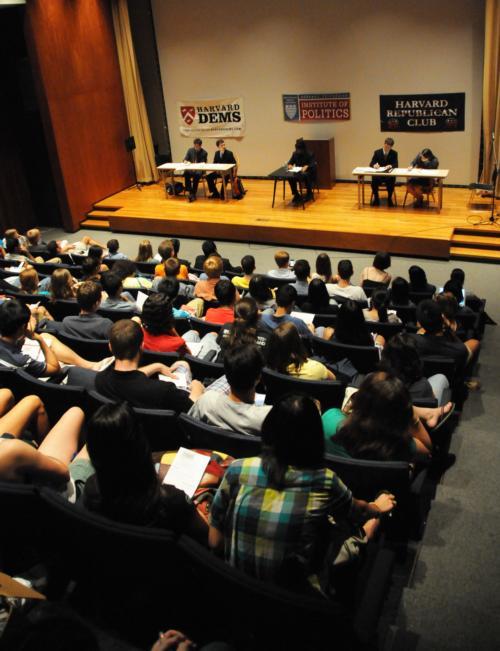
News
Cambridge Residents Slam Council Proposal to Delay Bike Lane Construction

News
‘Gender-Affirming Slay Fest’: Harvard College QSA Hosts Annual Queer Prom

News
‘Not Being Nerds’: Harvard Students Dance to Tinashe at Yardfest

News
Wrongful Death Trial Against CAMHS Employee Over 2015 Student Suicide To Begin Tuesday

News
Cornel West, Harvard Affiliates Call for University to Divest from ‘Israeli Apartheid’ at Rally
Politicos Debate Cure for Healthcare Woes

Harvard College Democrats and the Harvard Republican Club clashed in a debate on health care reform this Saturday.
In a heated discussion that centered primarily around the public healthcare option advocated by President Barack Obama, Democrats William F. Weingarten ’11 and Cyrus B. Kornfeld ’12, asserted that public option will increase care access, while Republicans Colin J. Motley ’10 and Jordan A. Monge ’12, contested that the plan will be costly and inefficient.
Kornfeld opened the debate by pointing out what he saw as a crisis within the current healthcare system, which “allows a hundred thousand people to die sick every year without receiving treatment”.
“A public option is the perfect cure for this unhealthy healthcare system. It is not driven by the perverse incentives of those private healthcare companies, and it will inject competition into the market,” he said.
Motley argued that a public option will crowd out private providers, suppress competition, and “not solve the problem at an acceptable cost” to the taxpayers. Instead, Motley proposed a four-point plan which he said will stimulate competition and drive down costs.
The plan included lifting restrictions on inter-state insurance purchase, eliminating employer tax exemptions for healthcare, capping amount awarded in malpractice suits, and investing in information technology to increase access to primary care practitioners.
“This isn’t a solution we can live on. We need to do something that will bring cost under control,” Weingarten said of the Republicans’ plan. “We cannot afford to let insurance companies play with our lives and our money as they continue to cover less for more with no incentive to change.”
The event, advertised as a part of “Get Involved Weekend” hosted by the FDO, was attended primarily by freshmen.
Spencer Todd ’13, said he was drawn to the event by his interest in politics.
“I thought this was one of the best debates I’ve seen. The Republicans dealt with the issues substantively, and neither side tried to clot the debate with rhetoric,” Todd said. “This definitely made me more interested in getting involved.”
“The debate answered many important questions, but I wish the Dems could have better addressed the Republicans’ [proposed] plans and some of the misleading statements that they said,” Nicholas Pomata ’13, said.
The debate was hosted by the Harvard Political Union and moderated by HPU Chairman Shankar G. Ramaswamy ’11.
—Staff writer Manning Ding can be reached at ding3@fas.harvard.edu.
Want to keep up with breaking news? Subscribe to our email newsletter.
